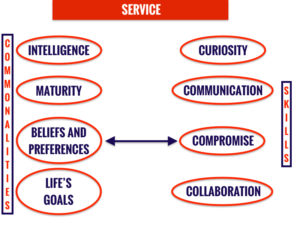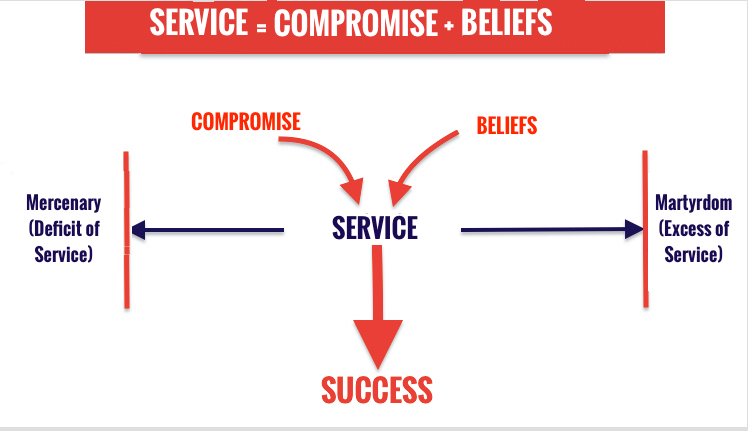Service is defined in the dictionary as "supplying or delivery," or "a system supplying a public need such as transport, communications, or utilities such as electricity and water." The nature of this term is seen as being of appeal as a trait in a partner which one needs if they are more of a thinker and private person, but enjoy access to people and experiences other than their more comfortable, humble world. It is a character trait and virtue that you want, when you see yourself desiring a partner with both "devotion" (as in, "to a cause") and "access" or "connections." Service is a combination of the Skill of Compromise with the trait (or Commonality) of Beliefs.
 Compromise as a skill of commitment, takes us into a relationship level built at first on curiosity about each other's inner workings, then maximizing communication, and into a more "synthetic" mode of weaving our lives together. This will involve common goals, but also common "beliefs." This means that mature, advanced Compromise as a set of skills does not just amount to "sacrifice" of our personal goals. Instead, it is a mature effort to truly pick through what aspects of one's personal dreams can be aligned into a common goal, and to do that, we will have to find common beliefs that form a framework for building strategies that grow a life together. It implies having a "system" or "network."
Compromise as a skill of commitment, takes us into a relationship level built at first on curiosity about each other's inner workings, then maximizing communication, and into a more "synthetic" mode of weaving our lives together. This will involve common goals, but also common "beliefs." This means that mature, advanced Compromise as a set of skills does not just amount to "sacrifice" of our personal goals. Instead, it is a mature effort to truly pick through what aspects of one's personal dreams can be aligned into a common goal, and to do that, we will have to find common beliefs that form a framework for building strategies that grow a life together. It implies having a "system" or "network."
Two objects hurtling at each other will not combine nicely, but two "systems" can go through turbulence in joining together, eventually settling into a new equilibrium. For example, in meterology, a high pressure weather system may collide with a low pressure weather system, and the result may include precipitation, tornadoes, and the like, eventually calming to a meteorological equilibrium.
Likewise, it would be highly unrealistic to expect to see a couple made of two very different individuals, trying to join lives, and not go through some sort of drama, if not relationship turbulence. What makes Service unique as a character virtue, is that it offers the partner, and the relationship, a stable system of resources, friends, career solidness, and perhaps finances that serve as a "buffer" for the natural blending of two separate psychologies. More than just "a stable person," the partner with a gift of Service tends to have numerous, well-established venues and networks for "riding out storms" (such as the formation of a relationship by two people with unique life stories.)
Consider the "delivery system" in the definition to be sets of "social buffers," such as having enough friends to bouy disagreements and joining points in a new relationship that is synthesizing itself together, and the service-oriented person having grown such systems by way of the helpfulness with which they have treated others for years. Such a person may be called, "an old soul," or even "longsuffering" for the benefit of others, and their value is incalculable to the relationship. They have unlimited patience, at least to the point of being taken for granted, since virtues also have good boundaries.
We may clearly see examples of how personality style may also align with the higher-brained notion of a mature character virtue, here. For example, if one were a Lover Personality, full of the unlimited capacity to dispense out well-being to others, you might see how the further development of a rich, character virtue might come very naturally to them. A Warrior Personality, with Authority as a character virtue may be a perfect match of not only personality, but the refinements of character virtue as well, the person of authority making the "battle plans" for the couple, and the service-oriented person employing their networks to execute those plans together.
Yet, we need to remember that personality styles have a limited number (four), while each of the many virtues of mature character need not be tied to a particular personality style. Some combinations just work well together. There may be just as service-driven Warrior and Magician personalities, and as many Lover and King or Queen personalities who are authoritative.
Through combining compromise with beliefs, Service links the higher brain to both the mammalian brain (giving Well-being, comfort and satisfaction to the partner) as well as the reptilian brain, through being a character virtue that either amplifies femininity in the partner through a Posiedon-like providing of channels and resources toward achieving a goal, or else amplifies the masculinity in the partner through expressing service as an elevating of the man's status in a hierarchy, or "on a mission" - a gift to the man's goals, by the woman (alongside the Ariadne Instinct in her, which amplifies the Theseus Instinct in him - letting him know he is preferred and special by way of the assistance of the woman, and more effective in his career aspirations because of her connections.) It is a kind of "golden thread of Ariadne" that Service offers.

The vice of deficit for Service is called, "Mercenary," which is in essence, still "delivering a service," but not freely giving, expecting a cost in return that is usually of a much higher price than the value of that service. This is also a commentary on the specifics of poor boundaries and codependence, as those who have both, tend to easily fall prey to the mercenary types.
Mercenary behavor toward a potential partner is similar to the common phrase that partners say of each other: "The cost of being with her," Or "Being with him has strings attached," or simply, "she used me."
These features show the vice in some relationships that pertain to the deep meaning of the value of "work" at a relationship, which is never about one partner "falling in line" with the agenda of the other partner. Rather, it is about the joining together in the work of providing an environment for the other partner to thrive in, through thick or thin, richer or poorer. Neglect of mutual service is one of the many ways that modern couples tend to ignore or violate their own marriage vows - which are serving an delivering love to each other both in good times and in bad.
We might often see a couple have a falling out, because they can sense a kind of fraudulent nature in the hints of unfair division of labor, or victim-like attitude in mercenary and martyrdom as vices, when instead, we needed their Service as a virtue - something that can only come from a mature, constructive attitude and actions in the partnership.
Service has bearing on our performance in phase three - intellectual attraction - step eight, where we seek to amplify the best virtues toward our goals. It is what causes us to see our mate as the most important "connection" in our lives, and us to feel access to social and other resources that we wouldn't otherwise have.

